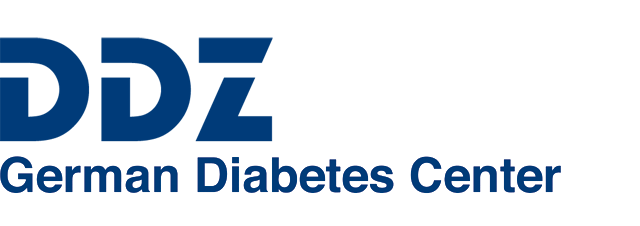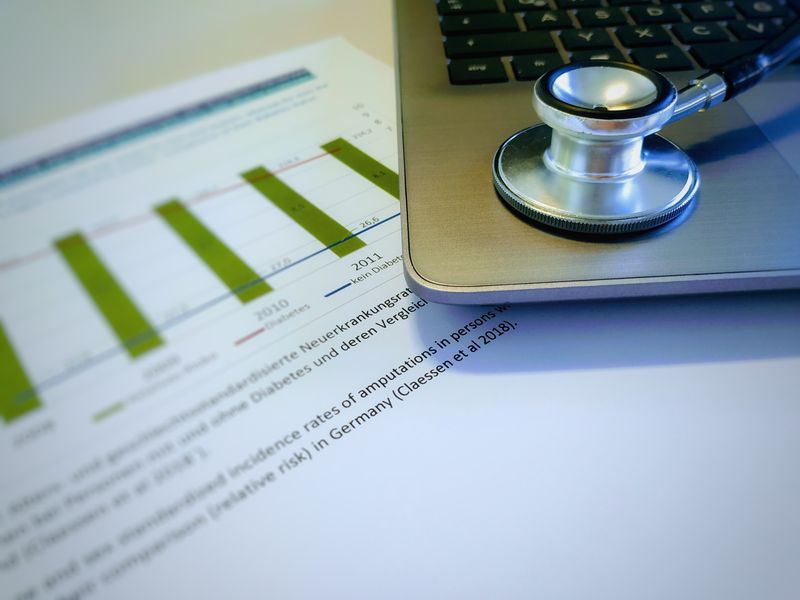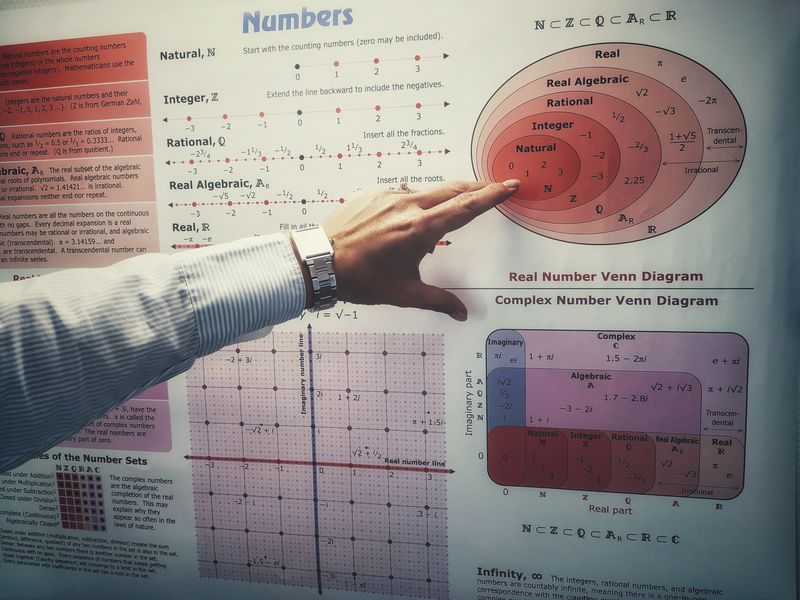The Institute for Health Services Research and Health Economics (ISE) studies the demand for and utilization of health care services, health care structures and processes, and their clinical and cost-effectiveness, in particular under everyday conditions and considering patient needs and preferences.
It thereby contributes to the development, evaluation and implementation of targeted, efficient interventions in compliance with international standards.
The ISE is responsible for the ‘Patient-relevant aspects and health economic evaluation of diabetes prevention and treatment’ research program, which it implements in cooperation with the other DDZ institutes.
The ISE working groups are tightly interlinked. Close ties are maintained with the Institute for Health Services Research and Health Economics at the Centre for Health and Society of the Medical Faculty of the Heinrich Heine University.
The ISE is also committed to greater involvement of patients and citizens in research. The ISE is continuously looking for interested people to work as co-researchers together with scientists in research projects. In this context, a citizens' advisory board was also founded.
Managing Directors
Patient and public involvement in research
The Institute for Health Services Research and Health Economics is looking for interested patients and citizens for smaller and larger projects. We know from previous projects that both groups have important ideas and competencies in research projects.
Team
-
Dr. PH Sandra Olivia Borgmann, M. Sc.
-
Dr. PH Manuela Brüne, M. A.
-
Stella CaloVisiting personnel (Heinrich-Heine-Universität Düsseldorf)
-
Dr. PH Nadja Chernyak
-
PD Dr. sc. hum. Heiner Claessen, Dipl.-Math. (FH)
-
Alina Clames, M. Sc.
-
Jan Dyczmons, M. Sc.
-
Dr. rer. nat. Veronika Gontscharuk, M. Sc.-Math
-
Gregory Gordon Greiner, MPH
-
Robert Gutu, M. Sc.
-
Paul Hinck, M. Sc.
-
Sophie Janus
-
Univ.-Prof. Dr. rer. pol. Nadja Kairies-SchwarzVisiting personnel (Heinrich-Heine-Universität Düsseldorf)
-
Linda Latsch
-
Dr. Maria Narres, M. Sc. PHVisiting personnel (Heinrich-Heine-Universität Düsseldorf)
-
Dr. rer. nat. Jana Sommer, Dipl.-Psych.Visiting personnel (Heinrich-Heine-Universität Düsseldorf)
-
Dr. rer. pol. Markus Vomhof, Dipl.-VW
-
Maximilian Zinn, M. Sc.
Selected Publications
- Sommer J, Dyczmons J, Grobosch S, Gontscharuk V, Vomhof M, Roden M, Icks A 2020. Preferences of people with type 2 diabetes for telemedical lifestyle programmes in Germany: protocol of a discrete choice experiment. BMJ Open. 10. https://doi.org/10.1136/bmjopen-2020-036995
- Kvitkina T, Narres M, Claessen H, Metzendorf M-I, Richter B, Icks A 2020. Incidence of stroke in the diabetic compared with the non-diabetic population: a systematic review protocol. Diabetes-Metab Res Rev. 36. https://doi.org/10.1002/dmrr.3311
- Vomhof M 2019. Verbesserung der Adhärenz zur Lebensstiländerung von Menschen mit Diabetes. Der Diabetologe. 15: 542-548. https://doi.org/10.1007/s11428-019-0517-1
- Finner H, Gontscharuk V 2018. Two-sample Kolmogorov-Smirnov type tests revisited: Old and new tests in terms of local levels. Ann Stat. 46: 3014-3037. https://doi.org/10.1214/17-AOS1647
- Lindner LME, Gontscharuk V, Bächle C, Castillo K, Stahl-Pehe A, Tönnies T, Yossa R, Holl RW, Rosenbauer J 2018. Severe hypoglycemia and diabetic ketoacidosis in young persons with preschool onset of type 1 diabetes mellitus: An analysis of three nationwide population-based surveys. Pediatr Diabetes. 19: 713-720. https://doi.org/10.1111/pedi.12628
- Hoffmann J, Haastert B, Brüne M, Kaltheuner M, Begun A, Chernyak N, Icks A 2018. How do patients with diabetes report their comorbidity? Comparison with administrative data Diabetes-related comorbidity in self-reported and administrative data: Comparison with administrative data. Clin Epidemiol. 10: 499-509. https://doi.org/10.2147/CLEP.S135872
- Claessen H, Kvitkina T, Narres M, Trautner C, Zöllner I, Bertram B, Icks A 2018. Markedly Decreasing Incidence of Blindness in People With and Without Diabetes in Southern Germany. Diabetes Care. 41: 478-484. https://doi.org/10.2337/dc17-2031
- Gontscharuk V, Finner H 2018. On the asymptotics of a normal beta-transformed empirical process. J Stat Plan Infer. 193: 103-108. https://doi.org/10.1016/j.jspi.2017.08.006
- Grobosch S, Kuske S, Linnenkamp U, Ernstmann N, Stephan A, Genz J, Begun A, Haastert B, Szendrödi J, Müssig K, Burkart V, Roden M, Icks A for the GDS Group 2018. What information needs do people with recently diagnosed diabetes mellitus have and what are the associated factors? A cross-sectional study in Germany. BMJ Open. 8. https://doi.org/10.1136/bmjopen-2017-017895
- Herder C, Fürstos JF, Nowotny B, Begun A, Strassburger K, Müssig K, Szendroedi J, Icks A, Roden M for the GDS Group 2017. Associations between inflammation-related biomarkers and depressive symptoms in individuals with recently diagnosed type 1 and type 2 diabetes. Brain Behav Immun. 61: 137-145. https://doi.org/10.1016/j.bbi.2016.12.025
Project Funding
- Federal Ministry of Health (BMG)
- Federal Ministry of Education and Research (BMBF)
- German Research Foundation (DFG)
- European Union (EU)
- Gemeinsamer Bundesausschuss, Innovationsausschuss (Innovationsfonds)
- Zentralinstitut für die kassenärztliche Versorgung (Zi)
Teaching activities
Teaching in medical degrees:
Within the model study program of the Heinrich Heine University, the ISE is responsible for the subject ‘health care system, public health care and health economics’. It is active in the following modules:
- Medicine, humans and society (1st year of study)
- Clinical reasoning and practice in diagnostics and therapy (3rd year of study)
- Musculoskeletal system (4th year of study)
- Humans and environment (5th year of study)
Research seminar: Health Services Research
Graduate school
Teaching in cooperation with the Faculty of Business Administration and Economics
- Various cooperative interdisciplinary courses in the Public Health degree course and the Economics BA degree course
Teaching in the postgraduate Master program ‘Master of science in Public Health’
- Introduction to public health: ideas, history, methods
- Introduction to health economic evaluation and health technology assessment
- Introduction to health care system and health services research
- Health economic evaluation
- Writing of academic papers
- Research colloquium: current public health research
- Master colloquium
Graduate School
https://www.uniklinik-duesseldorf.de/en/centre-for-health-and-society/graduate-school
Instruments
Instruments for patient-relevant parameters are developed in the group (in German and English).
Fragebogen zum diabetesbezogenen Zeitaufwand von Patienten (German)
Questionnaire_Health and health care use (English)
Fragebogen zur Inanspruchnahme medizinischer Versorgung (German)
Questionnaire Medication (English)
Fragebogen zu Informationsbedürfnissen von Patienten mit Diabetes (German)
Questionnaire_Health and health care use (English)
Publications on the development, piloting and/or application of the instruments:
Chernyak N, Jülich F, Kasperidus J, Stephan A, Begun A, Kaltheuner M, Icks A. Time cost of diabetes: Development of a questionnaire to assess time spent on diabetes self-care. Journal of Diabetes and it‘s Complications 2017; 31(1):260-266.
Chernyak N, Ernsting C, Icks A. Pre-test of questions on health-related resource use and expenditure, using behaviour coding and cognitive interviewing techniques. BMC Health Serv. Res. 2012, 12(1),303. Hoffmann J, Haastert B, Brüne M, Kaltheuner M, Begun A, Chernyak N, Icks A. How do patients with diabetes report their comorbidity? Comparison with administrative data. Clinical Epidemiology 2017; 10: 499-509.
Icks A, Dittrich A, Brüne M, Kuss O, Hoyer A, Haastert B, Begun A, Andrich S, Hoffmann J, Kaltheuner M, Chernyak C. Agreement found between self-reported and health insurance data on physician visits comparing different recall lengths. Journal of Clinical Epidemiology 2016 (Epub ahead of print).
Chernyak N, Stephan A, Bächle C, Genz J, Jülich F, Icks A. Assessment of information needs in diabetes: Development and evaluation of a questionnaire. Prim Care Diabetes 2016; 10(4):287-92
Selected Activities
The ISE is active both nationally and internationally in working groups, at events to promote young scientists, etc.
Mt. Hood Meeting
The Mount Hood Diabetes Challenge Network is dedicated to promote an exchange of ideas and information between those developing and using health economic diabetes simulation models. It has run a diabetes computer simulation modelling conference bi-annually since 1999. A major focus point of the conferences is the comparisons of health economic diabetes models both in terms of their structure and performance.
In 2018, the Mt Hood Meeting was hosted by researchers of the ISE at the German Diabetes Center (DDZ).
Link: https://www.mthooddiabeteschallenge.com/conference
Workshop for Early Career Investigators in the Field of Health Services Research
4th Workshop for Early Career Investigators in the Field of Health Services Research in Düsseldorf at the Centre for Health and Society at Heinrich Heine University
In 2017/2018 the fourth Workshop for early career investigators “Health Services Research” established by the DFG (Deutsche Forschungsgemeinschaft) took place at the German Diabetes Center in Düsseldorf. The Workshop for Early Career Investigators was hosted by the Centre for Health and Society (chs) at the Heinrich Heine University in cooperation with the Center for Health Services Research of the University of Cologne (ZVFK), the Interdisciplinary Center for Health Services Research (IZVF) of the University of Witten/Herdecke, the Research Centre for Health Communication and Health Services Research at the University of Bonn, and the Institute for Health Services Research and Clinical Epidemiology of the University of Marburg.
The aim of health services research is to explore the daily routine of health care, to improve processes and to help ensure that suitable offers are made for all patients.
The workshop gives outstanding early career investigators in this field the opportunity to develop innovative project ideas and research projects.
EASD
EASD Study Group on Health Services Research and Health Economics
The second meeting of the EASD (European Association for the Study of Diabetes e.V.) Study Group on “Health Services Research and Health Economics” was held at the association’s 55th in Barcelona. The group was initiated by the ISE in 2018 under the leadership of Andrea Icks and is coordinated by the ISE team.
Despite the great importance for diabetes research, the EASD did not have a working group looking into health care research and health economics subjects before 2018. The group aims to pool, extend and further develop existing research activities. This includes patient-centered health care, in particular patient preferences in diabetes treatment. A further key area of work are health economic models about diabetes complications. The EASD Study Group seeks to act as an exchange platform for clinicians and researchers from diverse fields (health economics, health care research, epidemiology), and in the future also a platform for patients.



